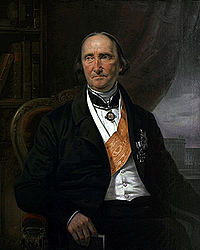Friedrich Carl von Savigny

Okay kiddo, so imagine you're playing a game of pretend where you're the leader of your own pretend country. You make all the rules that everyone has to follow. That's kind of what Savigny did, but with real countries and real laws.
Friedrich Carl von Savigny was a very important guy in Germany a long time ago, back when they didn't have the same kind of government and laws that they do now. Savigny was a professor of law, which is like being a really smart teacher who knows a lot about how laws work.
One of the things that Savigny is most famous for is something called "legal positivism." That's a big, fancy way of saying that he believed that laws are made by people and are influenced by the things that those people believe and value. For example, some countries might have laws that are very strict about certain things because the people who live there believe that those things are very important.
Savigny thought that laws should come from the people who are actually affected by them, like the citizens of a country. He believed in the idea of "legal customs," which means that laws should be based on the traditions and customs of the people who live in a certain place. So, if there's a certain way of doing things that people have been doing for a long time, then that should be reflected in the laws.
Another thing that Savigny is famous for is something called "civil law." That just means that he believed that laws should be written down and made official by people in charge, like lawmakers or government officials. This is different from "common law," which is more based on traditions and customs and is more informal.
So, to sum it up, Friedrich Carl von Savigny was a really smart professor of law who thought that laws should be based on the customs and traditions of the people who live in a place. He also believed that laws should be written down and made official by people in charge. Pretty cool, huh?
Friedrich Carl von Savigny was a very important guy in Germany a long time ago, back when they didn't have the same kind of government and laws that they do now. Savigny was a professor of law, which is like being a really smart teacher who knows a lot about how laws work.
One of the things that Savigny is most famous for is something called "legal positivism." That's a big, fancy way of saying that he believed that laws are made by people and are influenced by the things that those people believe and value. For example, some countries might have laws that are very strict about certain things because the people who live there believe that those things are very important.
Savigny thought that laws should come from the people who are actually affected by them, like the citizens of a country. He believed in the idea of "legal customs," which means that laws should be based on the traditions and customs of the people who live in a certain place. So, if there's a certain way of doing things that people have been doing for a long time, then that should be reflected in the laws.
Another thing that Savigny is famous for is something called "civil law." That just means that he believed that laws should be written down and made official by people in charge, like lawmakers or government officials. This is different from "common law," which is more based on traditions and customs and is more informal.
So, to sum it up, Friedrich Carl von Savigny was a really smart professor of law who thought that laws should be based on the customs and traditions of the people who live in a place. He also believed that laws should be written down and made official by people in charge. Pretty cool, huh?
